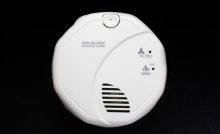Carbon Monoxide Leaks in the Workplace: Assessing the Threat
If you’ve never experienced a carbon monoxide leak in your place of business you should consider yourself lucky.
But over the long haul fortune favors the bold. For the sake of your employees and customers, you need to be well prepared for this possibility and take preventive measures to decrease the likelihood it ever happens.
Carbon Monoxide Detectors: What They Can and Cannot Do
Any business with an oil- or gas-burning furnace or boiler needs to have carbon monoxide detectors installed, as do commercial enterprises that use other types of fossil fuel-operated appliances (like restaurants with gas stoves, for example).
These detectors are highly effective and finely tuned to sniff out carbon monoxide leaks in their early stages. However, they do have a couple of “loopholes” that you should be aware of.
First of all, carbon monoxide detectors aren’t going to sound earlier or louder if a leak is sizable. Following an alarm you would hope to have time to shut off the power to your HVAC equipment and other “at-risk” appliances, open the doors and windows to clear the air and supervise the total evacuation of your building. But a fast and prolific leak might make this impossible, and since carbon monoxide is odorless and colorless its effects on your health are the only measurement you have to determine how grave the immediate threat might be.
If a carbon monoxide leak is detected and you find yourself experiencing any symptoms of discomfort, such as dizziness, headaches, nausea, mental confusion or sleepiness, don’t waste time. Get everyone out (including yourself) as fast as possible, shut the power off for the whole building (assuming you can without putting yourself in danger) and call your HVAC contractor immediately and ask them to send a technician over to help handle the emergency. If you use other gas- or oil-burning appliances you may have to summon a qualified professional to check them for damage as well.
The second problem with carbon monoxide detectors is that they can’t always identify small leaks, either sudden or continuing. Here, the only chance you’ll have to spot trouble is by observing the physical symptoms that often accompany carbon monoxide exposure (referenced in the previous paragraph).
If you or other building occupants experience these signs of illness there could be other causes besides carbon monoxide. Nevertheless, once you notice such symptoms you should contact your HVAC service provider to arrange a full inspection of your HVAC system right away.
Carbon Monoxide Leak Prevention 101
High-quality, regular maintenance of your commercial HVAC equipment and other gas/oil-burning appliances is the very best way to prevent carbon monoxide leaks from ever occurring. You should schedule yearly or twice-yearly cleaning and maintenance visits with your HVAC contractor, and most of the top companies (like Kemnitz Air Conditioning & Heating, for example) offer preventive maintenance plans that can cut your costs for such services quite significantly.
Before the beginning of each heating season, you should also have your chimneys, fireplaces and wall or kitchen vents cleaned and cleared if obstructions are present, since poor ventilation can make an incidence of carbon monoxide leakage much more dangerous than it has to be.
Whatever Your Concern, Kemnitz Air Condition & Heating, Inc. Has the Solution
If you own or manage a business in Orange County or the surrounding area and are concerned about the threat of carbon monoxide leakage, please contact us today.
At Kemnitz Air Condition & Heating we understand how dangerous carbon monoxide leakage can be. Hire us to handle your HVAC maintenance chores and we will carefully inspect every inch of your HVAC system during each regular visit, paying special attention to the heat exchanger (the source of most carbon monoxide leaks).
If we find any problems we will fix them, it is just as simple as that, because your safety is our first and most important concern.
Continue to visit our blog for the facts you need to know about indoor air quality restoration and the safe, efficient operation of your HVAC equipment.
Recent Posts
How to Combat Mold Issues in Your Commercial HVAC
Mold growth within HVAC systems is a critical concern for commercial buildings, notably in areas…
Debunking Common Myths About Home Heating Systems
As with most other kinds of technology, heating and air conditioning systems have their fair share of…
The Link Between Home Heating and Indoor Humidity
As we brace for the upcoming cooler months, understanding the intricate link between home heating…
How Long Will My New Heat Pump Last?
Your heat pump plays a crucial role in maintaining year-round comfort in your home, effortlessly…
Signs You Need to Switch Commercial HVAC Service Providers
In the ever-evolving commercial landscape, maintaining optimal HVAC system performance is crucial for the comfort…
Keep Your HVAC in Top Form This Fall With This To-Do List
With the autumn season rolling in, local residents are starting to feel the slight chill…





